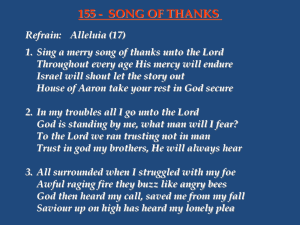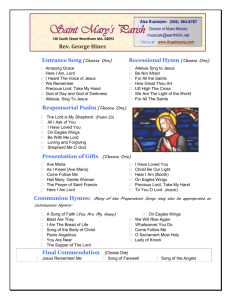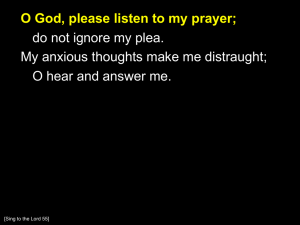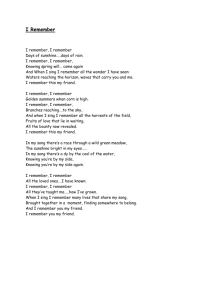A Letter to Young American Catholics
advertisement
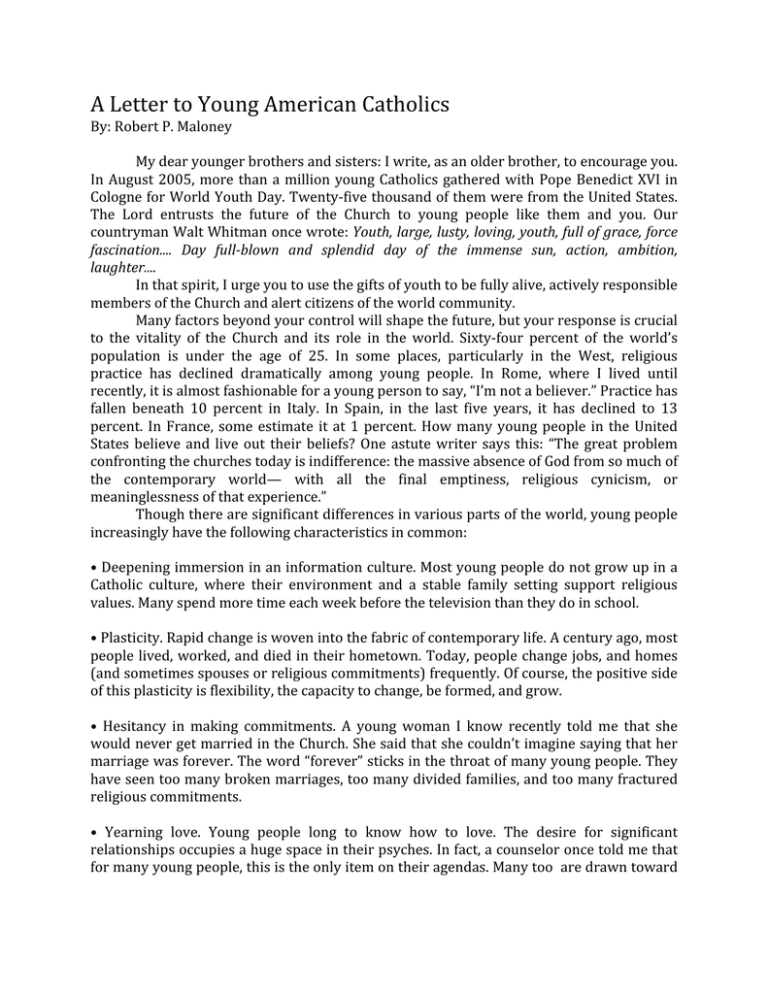
A Letter to Young American Catholics By: Robert P. Maloney My dear younger brothers and sisters: I write, as an older brother, to encourage you. In August 2005, more than a million young Catholics gathered with Pope Benedict XVI in Cologne for World Youth Day. Twenty‐five thousand of them were from the United States. The Lord entrusts the future of the Church to young people like them and you. Our countryman Walt Whitman once wrote: Youth, large, lusty, loving, youth, full of grace, force fascination.... Day full­blown and splendid day of the immense sun, action, ambition, laughter.... In that spirit, I urge you to use the gifts of youth to be fully alive, actively responsible members of the Church and alert citizens of the world community. Many factors beyond your control will shape the future, but your response is crucial to the vitality of the Church and its role in the world. Sixty‐four percent of the world’s population is under the age of 25. In some places, particularly in the West, religious practice has declined dramatically among young people. In Rome, where I lived until recently, it is almost fashionable for a young person to say, “I’m not a believer.” Practice has fallen beneath 10 percent in Italy. In Spain, in the last five years, it has declined to 13 percent. In France, some estimate it at 1 percent. How many young people in the United States believe and live out their beliefs? One astute writer says this: “The great problem confronting the churches today is indifference: the massive absence of God from so much of the contemporary world— with all the final emptiness, religious cynicism, or meaninglessness of that experience.” Though there are significant differences in various parts of the world, young people increasingly have the following characteristics in common: • Deepening immersion in an information culture. Most young people do not grow up in a Catholic culture, where their environment and a stable family setting support religious values. Many spend more time each week before the television than they do in school. • Plasticity. Rapid change is woven into the fabric of contemporary life. A century ago, most people lived, worked, and died in their hometown. Today, people change jobs, and homes (and sometimes spouses or religious commitments) frequently. Of course, the positive side of this plasticity is flexibility, the capacity to change, be formed, and grow. • Hesitancy in making commitments. A young woman I know recently told me that she would never get married in the Church. She said that she couldn’t imagine saying that her marriage was forever. The word “forever” sticks in the throat of many young people. They have seen too many broken marriages, too many divided families, and too many fractured religious commitments. • Yearning love. Young people long to know how to love. The desire for significant relationships occupies a huge space in their psyches. In fact, a counselor once told me that for many young people, this is the only item on their agendas. Many too are drawn toward transcendence. They are ultimately unsatisfied in the relationships they experience. They yearn for a love that goes beyond their everyday experience of love. Contemporary society often attempts to sell youth the wrong dream: money, the triumphant Lone Ranger, the need to have more of everything and to have it now, perfect sex. Who, then, are the models young people seek to imitate: Jesus, the Virgin Mary, Mother Teresa, the saints and martyrs? Or are they more likely to be LeBron James, Julia Roberts, Denzel Washington, and Maria Sharapova? To use the play on words of one contemporary writer, we live in an era of “clashing symbols.” The values that our faith presents often collide against those that our culture promotes, with a discordant clang. So I urge you to sing a new song. What might that song be like? Sing a Deeply Spiritual Song This seems quite obvious, but nothing is more important. To quote St. Paul (Rom 13:14), all Christian life aims at “putting on the Lord Jesus Christ.” For the Christian, Jesus is the absolute centre “I am the way, the truth, and the life,” he says; “no one comes to the Father except through me....I am the vine....I am the gate....I am the shepherd....I am the light....I am the true bread come down from heaven. The one who feeds on my flesh and drinks my blood will live forever.” I encourage you to make a commitment today that will slowly change your life. Spend a quarter hour each day with the Lord in silent, meditative prayer. This is not an easy commitment to keep in the midst of a busy schedule at school or at work or at home. But find a place where, in the words of St. Matthew’s Gospel, you can shut the door on the noise of the world and talk to the Lord and listen to him. Read a short passage from the New Testament and ask the Lord: “Lord, what are you saying to me? What do you want me to do today?” If you learn to live in the presence of the Lord, love him deeply and ponder his word, then you will surely sing a deeply spiritual song in life. Let Your Song Be Not a Solo, but a Chorus Learn to pray with and work with others, too. Pope John Paul II wrote this: “Our Christian communities must become genuine ‘schools’ of prayer, where the meeting with Christ is expressed not just in imploring help but also in thanksgiving, praise, adoration, contemplation, listening, and ardent devotion, until the heart truly ‘falls in love.’ Intense prayer, yes, but it does not distract us from our commitment to history: by opening our heart to the love of God it also opens it to the love of our brothers and sisters, and makes us capable of shaping history according to God’s plan” (Novo Millennio Ineunte, No. 33). Our prayer together should lead to action together. Divorced from action, prayer can turn escapist. It can lose itself in fantasy and create illusions of privatized holiness. On the other hand, service divorced from prayer can become shallow. It can have a driven quality to it. It can become an addiction. A healthy spirituality is at its best when it holds prayer and action in dynamic tension with each other. Let It Be a Song of Service to the World Because of rapid transportation and communication, the world community is becoming smaller. At the same time, the gap between the rich and the poor is becoming larger. It is hard for most of us here in the United States to imagine the terrible imbalance in the distribution of this world’s goods, because we rarely come face to face with the poorest of the poor. Let me give you just one example. Not long ago, Time magazine published some remarkable statistics about Africa. The question posed was this: What percentage of the population in various African countries lives on less than $1 a day? The answer might surprise you: Populations Living on Less then a $1 per Day Congo—91% Ethiopia—85% Chad—82% Zambia—80% Tanzania—79% Niger—74% Angola—73% Somalia—72% There are millions of people on every continent who live in dire poverty. In the spirit of today’s Church, make the poor a key element in your vision of the world, in your spirituality. Find practical ways of serving the poor as you study or work now and, later on, wherever you may be. Always ask yourself: What is the need of the poor person crouched in the doorway of the building nearby? What is the AIDS patient’s most acute pain? What does the sick person at home or in a hospital yearn for? What are other young people calling out for in the school I attend? Let Yours Be a Wake­Up Song to the World At one of their synod meetings, the world’s bishops wrote this rousing message to young people: “You, young people, you are ‘sentinels of the morning’....How is the Lord of history asking you to build a civilization of love? You have a keen sense of what honesty and sincerity require. You do not want to be caught up into divisive ethnic struggles nor poisoned by the gangrene of corruption. How can we be disciples of Jesus together and put into practice Christ’s teaching on the Mount of the Beatitudes”? In the ancient and medieval worlds, sentinels stood guard on the city walls, looking toward the East to catch the first glimpse of the rising sun. Since there were no clocks or bell towers in those days, they beat a drum or rang a gong to wake up the city. In a Christian worldview, the rising sun is Jesus, the risen Lord. How I urge you to rouse the world to his presence! Do not settle for indifference. Do not be lulled to sleep by a continual hunger for material possessions or an overabundant diet of them. Be aware of the presence of Jesus the risen Lord, the rising sun, and develop a profoundly Gospel‐centered, service‐centered spirituality in your life. Over 2,500 years ago, reflecting gratefully on the mystery of God, the composer of one of the psalms cried out (Ps 27:5), “I will sing and make music for the Lord.” I encourage you today to sing a new song. Sing a deeply spiritual song, not a solo, but a harmonious symphony, a song of service, a liberation song, a wake‐up song to the world. Let your song be a rousing, beautiful hymn, a great chorus resounding to the glory of God and ringing out as good news for the world. Robert P. Maloney, C.M., who until recently served as the superior general of the Congregation of the Mission, is now on sabbatical in Washington, D.C. Reprinted with permission from America, September 19, 2005

